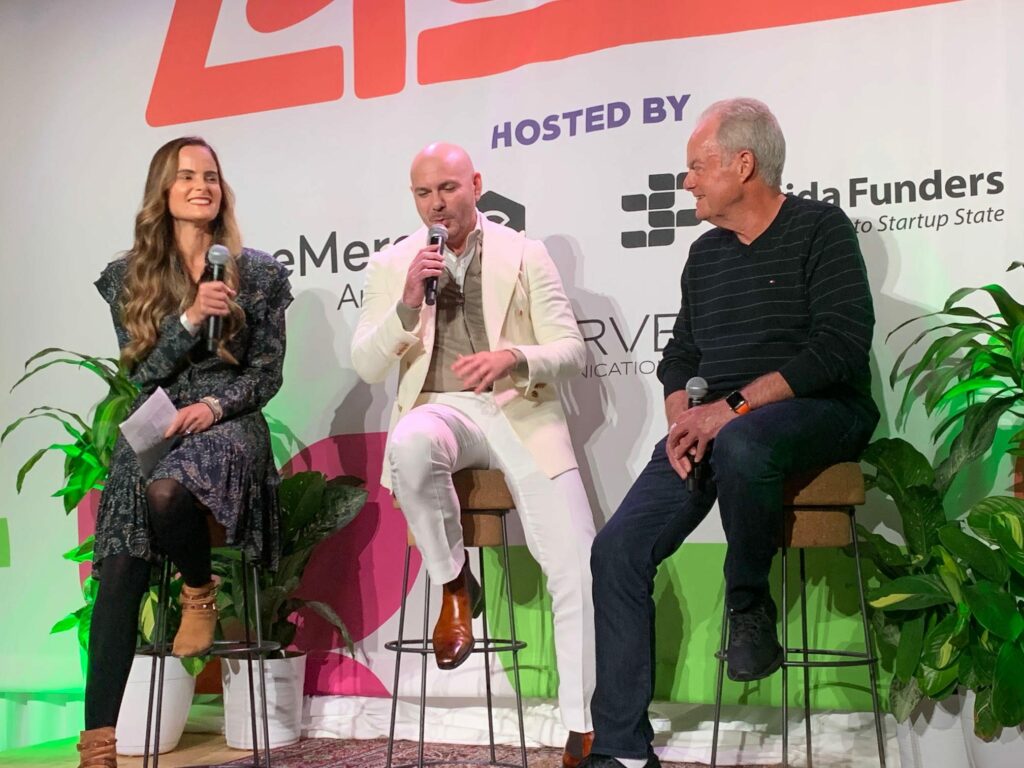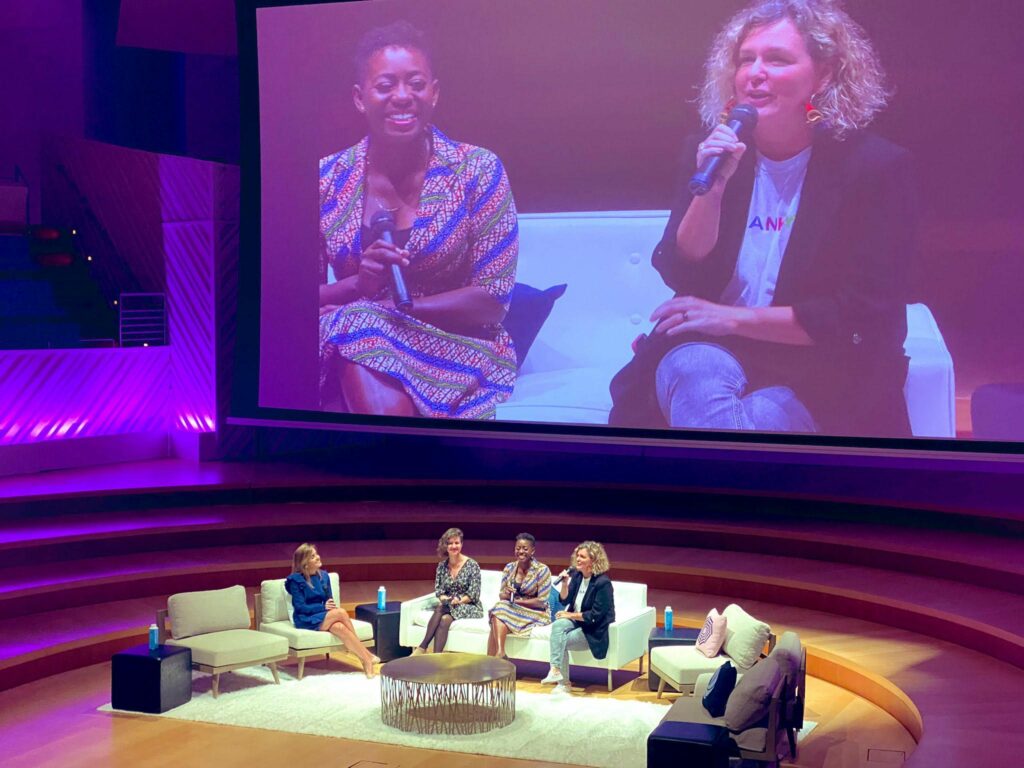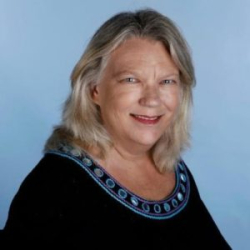Miami Art Week (aka TechBasel) was a time for #MiamiTech’s crypto enthusiasm to shine.
Web3 is coming fast. Is #MiamiTech ready to seize the opportunity? With much infrastructure building already underway, will South Florida be at the forefront of this next wave — or is it already? Signs point to yes on all fronts, if events during TechBasel this past week gave us any clues.
The conversations with a who’s who of speakers – and the lines of folks waiting to talk to them after the talks — were emblematic of the rising tide of the Magic City’s crypto enthusiasm. Still, as founders and community builders pointed out throughout the week, there’s work to do on the home turf.
Here are a few insights from the week, and what they could mean for South Florida.
‘Bitcoin is the Alpha and Omega’
After a full day conference and show about NFTs on Tuesday (read our recap on NFT BZL here), another gathering opened their day of discussions and networking with Anthony Pompliano and Mike Arrington, both now Miami residents, talking all things Bitcoin, and why they are super bulls. The following day, a 500 Global investor conference kicked off with Cathie Wood defending her views on investing in the crypto space with a skeptical Jason Calacanis.
“We believe we are going into a supercycle in Bitcoin,” said Arrington, founder of TechCrunch and now running his own VC firm, at the two-day La Casa event put on by eMerge Americas, Florida Funders and Carve Communications. “Bitcoin is the Alpha and Omega – the only asset in the world you can really count on,” said Arrington.
While crypto is still too difficult for the average user, “defi needs to be fixed” and fees need to come down, Arrington sees much promise in startups like BlockFi and Miami’s QuickNode, investments of Pompliano’s as well. And a little Bitcoin can go a long way, event a 1%-2% stake in a portfolio.
What are some key milestones to watch for? Pompliano says good signs are when more companies going public, when the trillion-dollar market cap is hit, and traditional players are getting interested. Pompliano, an investor and popular podcaster, describes the current situation as a “Buy Now, Learn Later” market.

Over at PreMoney 2021, 500 Global’s all-day event, Wood of Ark Invest said she reminded her team that morning that the recent tech market retreat is no time to panic. “This is when our long-term performance is established,” she said. “Keep your eye on the prize.”
Ark is looking for winners among digital wallet makers. After 30 years in enterprise tech without much change, “we think Covid has inspired a wholesale refresh, which the traditional world has not priced in,” she said.
Investing must change too. “I think the accreditation laws are un-American. We are talking to the SEC about this — stay tuned,” said Wood, who recently relocated her firm from New York to St. Petersburg. “Ark is all about democratization, and transparency, and disruptive innovation. We are working with the SEC to evolve the strategy which would include public and private entities in one wrapper, and open it up.”
She reminded the audience that the early days of innovation are full of chaos and always messy. “There’s this sense that the web3 world is evolving away from bitcoin and more centralization. If you take this to the extreme you are talking about recreating Visa and that is what we are trying to get away from,” she said. “Bitcoin is the first global private digital rules-based monetary policy and if you look what’s going on in El Salvador it is going to be transformational in terms of purchasing power and wealth,” she said, noting that now 3 million of the 4 million Salvadorans now have bank accounts, up from only 1.2 million just a year ago. “This is the most secure blockchain technology out there and we are really talking about a new economic order.”
As for signs to watch? Developers are dropping out of big tech companies and exploring and creating on their own in the world of crypto and blockchain, Wood said. “I am watching the developers as I have done my entire career and it is usually the ticket to success.”

VC for all
Other recurring themes of the week were widening the access to capital and the changing face of VC.
Jesse Randall, CEO and co-founder of Sweater Ventures, is a case in point. At the La Casa event, he pointed out there are 13 million potential accredited households in the US but only 300,000 are registered angel investors. What about the rest of us? “Sweater is for all of us. Sweater is a mobile app that allows anyone to invest into a venture capital fund with a minimum of $500. We’re launching in Q1”. He said Sweater differs from equity crowdfunding because Sweater does all the work and the investor gets access to venture-caliber companies they wouldn’t get normally.
Miami will be a key part of the Sweater story, he said. “We see what is happening in Miami – it’s more than a flash in the pan. Miami is on the rise and is already becoming a strong technology ecosystem,” he said. Sweater is going to open an office down here, and is recruiting Venture Scouts. Randall also wants to hire another deal team member and is looking for someone who normally would have a hard time breaking into VC. “I want to open the door for them and I hope that person will come from Miami.”
Over the course of the two days, there was plenty of Miami on the La Casa stage: Derrick Thomas of MiamiTechRuns, Will Weinraub of OnChain, Brian Brackeen of Lightship Capital, Laura Maydon of Ascendo Venture Capital, Jamie Rosenberg of ClassWallet, Jonathan Lieberman of itopia, Jaclyn Baumgarten of Boatsetter, Lil Roberts of Xendoo, Jacob Shoihet of Marco, Michal Cieplinksi of Pipe, Michael Vega-Sanz of Lula, Andrew Parker of Papa, Dami Osunsanya of SoftBank, and many others.
Bring in the new
La Casa featured plenty of newer Miami residents as well. During a cafecito talk between Atomic founder Jack Abraham and Mayor Francis Suarez [pictured at the top of this post], Abraham recounted the story of how contracting COVID-19 while on vacation in Miami in the early months of the pandemic led to an unexpected extension to his trip, and in turn, seeing the city through a new lens.
While on Zoom calls, people would learn where he was and the first 30 minutes of the hour long conversation would turn into a ‘Why Miami?’.
“I almost felt the need to defend myself at first,” said Abraham, who moved from the San Francisco Bay Area. “I would tell them here’s Miami, here’s why this is a great place and here’s why I think it can be a really big part of the future, and a lot of those people actually ended up coming here and moving here.”
Now Atomic, a venture builder and fund, has made a home in the Annex, in the heart of Wynwood, and has plans to expand.
In March 2020, Steven Galanis, CEO and co-founder of Cameo, a unicorn, was ready to sign a lease for a new HQ in Chicago, but had a gut feeling to hold off. A few days later COVID showed its might, and he moved the company to be fully distributed for the first time. “We had a product that was a nice to have, and we worried that this could be the end for us,” he said. Instead, demand exploded. More than ever, he said, “people needed a to connect to people they care about … and share digital love.”
Galanis grew the company from 125 to 410 people located all over the world. “And for the first time in my life, I could live wherever I wanted. We’ve had an amazing time here, there’s so much energy in this city right now, it’s intoxicating,” said Galanis, who also spoke at La Casa. “I can’t wait to see what we build together.”
He compared the tech culture in Miami to his native Chicago. Both are community oriented and cosmopolitan with a music culture, he said, but he has sensed a divide between the people who have been in Miami and the new people and is hoping that gap narrows because “there is so much we can learn from each other.” In both places, there are serious founders building important solutions, Galanis said.

The changing face of VC
Back at 500 Global’s PreMoney conference at New World Center, the theme was the future of VC investing and much of the conversations were about how much the investing landscape has changed in the past couple of years – and how much more change is needed. While founders and investors are leaving Silicon Valley and New York for smaller tech hubs – and Miami seems to be the crowd favorite – 500 Global has always looked outside those hubs for investments. With $2.3 billion AUM, 500 Global has investments in 41 unicorns, nearly half outside the US. “Exceptional founders live in all corners of the world,” said Christine Tsai, CEO of 500 Global.
There were discussions about Web3 and NFTs, alternative finance, building generational wealth, SPACS, investing in social impact, even “shoe-nicorns.”
Miamians on the PreMoney stage included Maria Derchi Russo of Florida Funders and Refresh Miami, Leigh-Ann Buchanan of aire Ventures, Ana Paula Gonzalez of SoftBank, Laura Gonzalez-Estefani of TheVentureCity, Matt Haggman of the Beacon Council’s Opportunity MIami, Saif Ishoof, Raul Moas, Keith Rabois, Jeff Ransdell of Fuel VC, Carlos Domingo of Securitize and Felecia Hatcher of Black Ambition.
The diversity and inclusion discussion also took center stage at PreMoney. Mac Conwell, managing partner of Rarebreed Ventures who moderated a panel, remarked that you’ve probably not seen a VC panel like his before: Aatif Awan of Insu Valley Capital, Henri Pierre-Jacques of Harlem Capital, Maria Salamanca of Unshackled Ventures, Lolita Taub of Lightspeed, and Jillian Williams of Cowboy Ventures. Let go of the imposter syndrome, Conwell told the audience. “You are good enough.”

Buchanan founded aire ventures, a nonprofit venture studio that leverages data driven strategies to help improve racial equity and inclusion. “We are trying new things to see what works. We are a sandbox — if it works in Miami, it will work other places around the world,” she said. One of the organization’s first major projects is the just released REDI Scorecard, a yearlong project that surveyed 1,600 people in the tech ecosystem and found that access to capital was one of the biggest challenge for underrepresented founders in the Miami metro area, among other findings.
VC deployment has accelerated rapidly in South Florida this year – indeed Pitchbook announced this week that $3.5 billion has been deployed across 256 deals in the Miami-Fort Lauderdale metro area so far this year. “What we are not seeing is access points to that capital for underrepresented founders. That is a growth opportunity for the market,” said Buchanan, noting that in the first half, only four of 100+ deals were woman-led and there isn’t good data for founders of color. “We have an opportunity to study how that capital is flowing and whether it is flowing equitably.”

Hatcher, who oversees Pharrell Williams’ Black Ambition and co-founded the Center for Black Innovation in Miami, also believes venture needs change.
“We need more companies to understand the innovation potential of Black and Latinx startup founders. These companies are proving they can produce outsized returns,” said Hatcher, speaking at PreMoney. “But if you don’t care enough to respect those communities and the innovation there , you are missing out on deals. It’s not about charity. It’s good business.”
READ MORE TECHBASEL COVERAGE ON REFRESH MIAMI:
- At NFT BZL, Miami shines as crypto capital
- Global crypto platform will be title sponsor of eMerge Americas
- What happened after ‘How can I help?’
Follow @ndahlberg on Twitter and email her at [email protected]
- Human ingenuity, inspiration, a call to action: Miami Tech Talent Coalition takes the stage at eMerge Americas - April 24, 2024
- Miami Tech Month, where developers get their own conference, VCs take the stage, and anything is POSSIBLE - April 23, 2024
- Full circle moment for Johanna Mikkola, the new CEO for Tech Equity Miami - April 22, 2024





